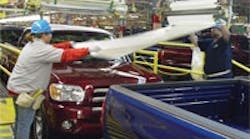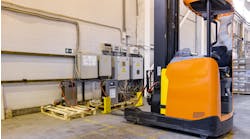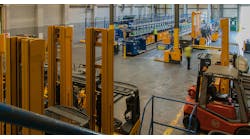Jim Dunn, president and CEO of Value Added Service Corporation (VASCOR, Georgetown, Ky.), says the auto industry looks at outsourcing more than other industries to further its targets.
“They’re demanding, for sure,” says Dunn of his OEM clients, such as Toyota, Chrysler and Hino. “We do a lot of work for Toyota, and it has very high standards. And, the reason for that is because the cost of failure is high.”
This is the 20th year for VASCOR, a joint venture between APL Logistics (Singapore) and Fujitrans Corp. (Tokai, Japan). It was formed as a third-party logistics provider for the automotive industry exclusively. While most 3PL operations are thought of as moving pieces and parts from here to there in an efficient manner, VASCOR does that and a whole lot more.
The company was originally formed to do work for Toyota Motor Manufacturing in Georgetown. As its reputation for providing quality services spread over the years, clients were added, and its range of services grew to include cross-dock management, coordinating and tracking containers from Japan to North American assembly plants, daily monitoring and reporting on ocean carrier performance and scheduling and coordinating import parts deliveries.
“We’re North America-centric,” says Dunn, “so there are some challenges unique to working in a global environment. Primarily, the supply chain is much longer. That generates a greater need for visibility and contingency planning.”
One of the benefits of having parent companies with global connections, says Dunn, is that his company can turn to them for help. VASCOR has in place software that allows it to do that kind of long-range and long-distance management.
Level of Trust
For a 3PL, working with any client requires a great deal of trust for both parties. Dunn says, at the start of a new project or service, the client will rightfully be looking over his shoulder until they’re convinced the transition has been made or a new service is running smoothly—and contingency plans are in place. On services that have been ongoing, the client company pays little attention. “Of course, you have to give them a reason not to look over your shoulder,” he says. “You have to be sure there are no surprises for them. They have to be informed of any problems and that you have recovery and contingency plans in place.”
One of the services VASCOR offered Toyota early on was finished vehicle inspection. It’s hard to image a part of the automobile-product process more critical than how the vehicle will look when the customer sees it for the first time. For Toyota to outsource this inspection function was a real compliment to VASCOR.
“We’ve grown up in the Toyota system,” says Dunn, “so we’re familiar with continuous improvement. We instill that, and empower our people to look for ways of improving. We document those ideas and take them to the customer.”
The vehicle inspection service is provided right at the assembly plants, as well as in more than 30 rail yards, during on-loading and off-loading, around the country. Dunn says specially trained inspectors, many of them long-term employees, code any defect they find. This information is sent to VASCOR’s data analysis team for review.
“We recognize that inspection is more than just finding a scratch or nick,” explains Dunn. “We’ve always viewed vehicle inspection as a sign that there is a problem someplace along the line and analyzed the data to find the root cause of the problem. Then, we work to eliminate that cause.”
And, while the client enjoys that kind of service, Dunn admits that, in some instances, it’s been so successful that it has worked its way out of a job.
About 10 years ago, based on its successes in vehicle inspection with Toyota, VASCOR was asked to do a feasibility study for Chrysler. It was able to show this automaker how money could be saved by reducing damage to vehicles while in transit. It now enjoys Chrysler’s inspection business, as well.
“There’s a high level of trust involved,” says Dunn. “However, it’s what you do with that information that makes a difference. Identifying trends, etc., and working with the OEM to find ways to eliminate those trends, is key.”
In addition to automotive companies, VASCOR works with auto carriers and railroads to eliminate damage. It’s another way for his company to add value, says Dunn.
Along with trust, another major part of vehicle inspection is consistency. Because VASCOR has years of experience in doing this kind of work, its processes are consistent. “People view things, like damage, differently,” says Dunn. “Because we’re ISO 9001 certified, our processes are predictable. The vehicles are looked at in the same way, regardless of who is doing it or where they are.”
Being a third-party logistics provider is all about customer service. Dunn says, in his experience working with automotive clients, the flow of ideas has always been a two-way street. “In our history, we’ve grown a lot from the days when customers would come to us and ask if we’d do whatever.”
He views customers asking for more as a compliment. “They wouldn’t ask for more if they weren't happy with what we were doing at the time. On the other side of the coin, as a 3PL, we’re obligated to look for ways of improvement and then take those ideas to our customers. That’s one of the values we bring. We’re in a position to come up with better, quicker, faster, less expensive ways to do things than what they’re currently doing.”



